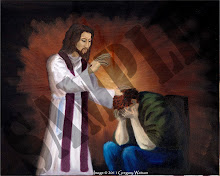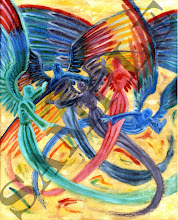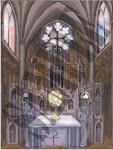(Warning: This post contains some mature themes pertaining to the Eucharist and Its relationship to us as "the Bride of Christ". I'd hesitate to let anyone 13 or younger read it without a parent's teaching presence.)
Since becoming a Catholic, I've encountered all sorts of criticism from well-meaning Christians who know that the main thing in Christianity is to have a "personal relationship" with Jesus. What they don't seem to know is that this relationship is available and encouraged in Catholicism. Many seem to think that the rituals and stuff stifles a free, spontaneous interaction with Jesus. Others claim that Mary and the Saints compete with Jesus and distract us from a relationship with Him. In fact, many people who leave the Catholic faith to become Protestant claim that they "weren't being fed," or "didn't ever hear the Gospel presented," or that they had never "asked Jesus into their heart." All these claims boil down to one simple statement: People believe that knowing Jesus personally is not the be all and end all of the Catholic Faith.
I'm here to say that that just ain't so.
All Christians will tell you that "God is everywhere." The more spiritually discerning will recognise that God, who is everywhere, will "concentrate" (for lack of a better word) His ubiquitous presence in a certain place at a certain time. After all, what else could Jesus mean when He claimed in Matthew 18:20, that "When two or three are gathered in My name, there I am in the midst of them"? If Jesus is always everywhere in the same manner and proportion, why promise to be especially with those gathered in His name?
Yet, even this special, spiritual presence of Christ is but a pale shadow of the reality and enormity of His Presence in every Catholic Church. For Jesus is not only present in some sort of intangible, mystical way, but He is as physically, locally present to us as He was to the disciples 2000 years ago, albeit in a different manner. I'll say it again: Jesus makes Himself physically present to us, Body, Blood, Soul, and Divinity! And He is always there, in the Church, in the Tabernacle, waiting for us and welcoming us! He may be spiritually present among us when two or three are gathered in His name; but He is physically present in the Tabernacle, whether any living soul is around or not! And just as with His Disciples so long ago, so now He "eagerly desires to celebrate the Passover" with us (cf. Luke 22:15).
For it is here, in our "Passover", that is, the Eucharistic Celebration of the Mass, that Jesus comes again to us, and meets with us in a most intimate way! He not only comes to dwell near us, or with us, but in our devout reception of the Eucharist, He comes to dwell physically, intimately, in us! No wonder, then, that Jesus' Real Presence in the Eucharist is called by the Church, "the source and summit of the Christian life" (CCC #1324). And it is precisely this that gives the lie to the objections that Jesus is not emphasised, or that no true relationship with Him exists in the Catholic Church.
There has been much criticism regarding modern "praise and worship" music that portrays our relationship with Jesus almost in terms of a love relationship. Songs are criticised as being such sappy love songs that if we substituted "baby" for "Jesus" it would be just another pop love song on the radio. As far as aesthetics go, I quite agree with the criticism. But the message? The problem is not with comparing our love with Jesus to romantic love. Let's remember that the monks and mystics of the Church since time immemorial have viewed our relationship with Jesus in the most graphic terms of intimacy. The favourite book of monasticism seems to have been Song of Solomon, which they interpreted allegorically as being about our relationship with Jesus! Nothing in popular praise and worship songs rivals the erotic poetry of Solomon. In fact, the problem with most of these (Protestant) songs is that they are incomplete expressions of that fullness of intimacy. It is, to put it bluntly, singing about going all the way, when you've only ever made it to first or second base!
Modern scholars often are heard accusing the monks of "twisting" the Song of Songs into this allegorical meaning because they couldn't bear the thought of sex being so glorified in Sacred Scripture. What these modern scholars fail to realise, is that every monk knew that the key to understanding the allegorical meaning of Scripture was to base it on the literal meaning. They knew good and well that the Song of Solomon was a poem of unbridled eroticism celebrating the consummation of marriage! And it was from this understanding that they grew to understand the deeper meaning of our intimacy with Christ.
The reason modern scholars fail to grasp this, I submit, is that modern scholars have not experienced that deeper intimacy with Christ. Bluntly, there is more than metaphor going on in the Bible's description of the Church as the "bride of Christ"; and it is more than linguistic accident that that first marital act of sexual intercourse is known by the same term as the act of partaking of the Eucharistic Body of Our Lord: Consummation.
In first century Jewish culture, a man would betroth a woman in a legally binding covenant. For all intents and purposes, the couple was "married", and could share in all the "attendant privileges" of marriage. However, despite this, the betrothal period usually lasted about a year, because the groom had to "prepare a place" for his bride to live in his family's home. This preparation included both the physical living arrangements, as well as his establishment as provider. At the Last Supper with His Disciples, Jesus inaugurated the "New Covenant" in His blood (cf. Luke 22:20). It was through this Covenant that He betrothed His Church, and He specifically used language to convey that point, when He said, "Do not let your hearts be troubled. You trust in God, trust also in Me. In My Father's house there are many places to live in; otherwise I would not have told you. I am going now to prepare a place for you, and after I have gone and prepared you a place, I shall return to take you to Myself, so that you may be with Me where I am" (John 14:1-3, emphasis mine). This is the same formula as the marriage covenant that I discussed above! It's little wonder that Thomas and the other disciples were confused by Jesus' words! In their minds, the marriage connotations would have stood out, but not really made a lot of sense until later.
Thus, we are in the betrothal period, until the return of Jesus, when He will take us up to the Heavenly Wedding Feast! In the meantime, He comes to us, as the first century Jewish groom, and shares with us the intimacy of married life in the interim. The monks and nuns were not wrong in viewing themselves as "married" to Christ. They live in an extreme and symbolic way the marriage with Jesus to which we are all called, and in which we all participate in the Consummation of His Real Presence in the Eucharistic Host. And as in all such unions, the purpose is to "be fruitful and multiply," as Jesus Himself teaches us, when He continues the conversation at the Last Supper, telling us that we must abide in Him, and He in us, so that we can bear much fruit. And it is in the Eucharist (the Vine, of which we are the branches) that we achieve this abiding state. For Jesus is not only present to us in the celebration of the Mass--but He remains there, afterwards, in the Tabernacle, calling us to spend time in His Presence, in Adoration before the Tabernacle or the Monstrance. And as we leave, His Eucharistic Presence within us, we are filled with His grace, and transformed ever more into His likeness--that we too can become His monstrances to the world!
Why settle for first base, when Jesus calls us to go all the way?
Saturday 5 December 2009
Subscribe to:
Post Comments (Atom)







1 comment:
I had never made the Jewish betrothal connection! Excellent article. I haven't spent much time reflecting on the level of intimacy that Christ wants to provide us with. This has certainly helped. I don't think I ever quite fully knew that it was that way (and the way that the mystic described it - whoa). It's quite comforting; makes sense that God would be accessible on such a level...
Post a Comment